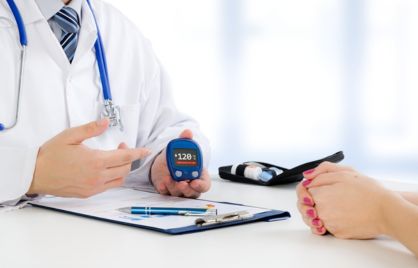14th October 2025
What You Should Know About Diabetes: Expert Corner with Dr. Issam Hajjaji
November 14th marks World Diabetes Day, an opportunity to raise awareness about a condition that affects thousands of people across Ireland.
Diabetes develops when your body cannot properly regulate blood sugar (glucose).
In type 1 diabetes, the body does not produce insulin (the hormone that moves glucose from your bloodstream into your cells for energy).
In type 2 diabetes, which accounts for about 90% of all cases, the body either does not produce enough insulin or cannot use it effectively (both abnormalities are usually present to varying degrees).
Over time, high blood sugar can silently damage blood vessels and nerves. This can lead to serious complications such as heart disease, stroke, kidney failure, vision loss and poor circulation. The good news is that early detection and lifestyle management can dramatically reduce these risks.
In Ireland, around 220,000 people are currently living with diabetes. Worryingly, it is estimated that a further 30,000 people may have the condition but are unaware of it. On top of that, around 146,000 people are considered to have prediabetes, a crucial stage where lifestyle changes can still prevent or delay the onset of diabetes.
These numbers tell a simple story: diabetes is one of Ireland’s fastest-growing health challenges, yet many people do not recognise the symptoms or realise they may be at risk.
.jpg?sfvrsn=4f04a162_0)
What are the symptoms of diabetes?
Diabetes, particularly type 2, often develops gradually and may not cause obvious symptoms at first. Early warning signs can include:
- Feeling unusually thirsty or hungry
- Needing to urinate more often
- Unexplained tiredness or lack of energy
- Blurred vision
- Slow-healing wounds
- Tingling or numbness in hands or the feet
Because these symptoms can be subtle or mistaken for simply “getting older” or “being run down,” many people do not realise anything is wrong. That is why regular health checks are so important, especially if you are over 40, overweight, or have a family history of diabetes. Detecting diabetes early allows it to be managed before it causes lasting damage.
What are the risk factors of diabetes?
Several factors increase your risk of developing type 2 diabetes:
- Being overweight, particularly carrying excess fat around the waist
- Having a family history of diabetes
- Being physically inactive
- High blood pressure
- High cholesterol
- Having gestational diabetes (diabetes during pregnancy)
- Belonging to certain ethnic backgrounds (South Asian, Middle Eastern, African descent)
The risk also rises with age, but it is important to remember that type 2 diabetes is increasing across age profiles because of rising rates of obesity and sedentary lifestyles.
What is prediabetes?
Prediabetes means your blood sugar is higher than normal, but not yet high enough to be diagnosed as diabetes. You may not feel unwell at this stage, but it serves as a warning sign, and an opportunity, to make changes before it is too late.
The encouraging news is that prediabetes is reversible. Regular exercise, losing even a small amount of weight (5 – 10% of body weight), and improving your diet can significantly lower your risk of developing diabetes.
A simple blood test carried out by your GP can identify prediabetes. If you are over 40 or have any of the risk factors mentioned above, getting check is recommended.
Is there a link between diabetes and menopause?
One area often overlooked is the link between hormonal changes at menopause and blood glucose control.
Falling oestrogen levels during menopause can affect how your body responds to insulin, potentially increasing the risk of developing diabetes, or making blood glucose levels harder to manage if you already have it.
Symptoms such as fatigue, sleep problems, and weight gain, which are common in menopause, can also mask early diabetes warning signs.
If you are going through this transition, regular check-ups and blood tests are especially important, particularly if you have a family history of diabetes or other risk factors. Simple lifestyle adjustments, combined with advice from your GP or an endocrinologist, can make a significant difference.
How can I prevent and manage diabetes?
Preventing or managing diabetes is not about extreme diets or rigid routines; it is about making realistic, sustainable changes that fit into your daily life.
Here are some practical steps you can take:
- Move more: aim for 30 minutes of brisk walking or moderate exercise on most days.
- Eat balanced meals: choose whole grains, lean proteins, fruit and vegetables. Cut down on sugary drinks and processed foods.
- Watch portion sizes: even healthy foods can cause weight gain if eaten in excess.
- Know your numbers: have your glucose, cholesterol and blood pressure checked regularly.
- Do not ignore warning signs: if something feels off - persistent tiredness, thirst, or vision changes - get tested.
Diabetes does not need to be a silent threat. The more you understand your risk, the more control you have over your health.
If you have been delaying a check-up, take this as your reminder to act - book a blood test, talk to your GP, or start by simply walking more and eating better.
The above content has been reviewed by Dr. Issam Hajjaji, Consultant Endocrinologist at Mater Private Network in Cork.










.jpg?sfvrsn=83254d5c_1)


